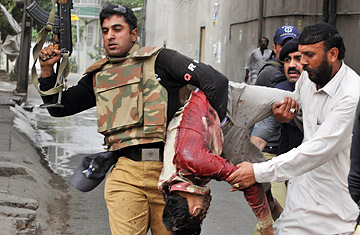
A Pakistani policeman carries the bloodied body of a worshipper from one of two mosques stormed by gunmen in Lahore
A long-persecuted minority Muslim sect suffered its worst assault ever on Friday, May 28, when armed militants attacked two mosques in the heart of Lahore, Pakistan's cultural capital and second largest city. More than 80 members of the city's Ahmedi community were killed and scores injured, according to a top police official, in a dramatic four-hour siege in which militants deployed a bomb, grenades and heavy gunfire.
The brazen attacks show the enduring ability of militant groups to strike deep inside the country, killing some of the most vulnerable sections of the population. They also demonstrate the growing strength of militancy in Punjab, Pakistan's largest and wealthiest region, where terrorist groups aligned with al-Qaeda and the Taliban have been reviving their sectarian agenda, increasingly persecuting minority groups while authorities do little to stop them.
The sieges took place within minutes of each other as members of the Ahmedi community were gathered for Friday prayers at mosques in the Garhi Shahu and Model Town neighborhoods, several kilometers apart. Gunmen entered the mosques, hurling grenades at the worshippers. Once inside, the attackers took hostages and, in the case of the Garhi Shahu assault, held off police efforts to end the siege for several hours. The Punjab police now claim they have established control and arrested suspects.
In a text message sent to several journalists, the Pakistani Taliban claimed responsibility for the attacks. "This is a final warning to the [Ahmedi community] to leave Pakistan or prepare for death at the hands of the Prophet Muhammad's devotees," said the chilling missive. It was signed by the Tehrik-e-Taliban Pakistan, the official name of the Pakistani Taliban, and the "Punjab wing" of al-Qaeda, a hitherto unknown group.
Over the past two years, Lahore has been rocked by several similarly coordinated attacks targeting security installations. The scenes on Friday, with gunmen firing out of minarets at defenseless worshippers, brought back grim memories of the December 2009 Taliban assault on a mosque used by military officers in Rawalpindi. However, this most recent episode was the first on such a scale against the Ahmedis, who have been subject to state excommunication since the 1970s and have suffered violence at the hands of hard-line Sunni extremists.
"Today's attack, in a charged atmosphere of sectarian militancy, underscores the vulnerability of the Ahmedi community," says Ali Dayan Hasan, senior South Asia researcher at Human Rights Watch. "The blurring of lines between the Taliban and Sunni sectarian militants places heterodox communities like the Ahmedis in double jeopardy. The Pakistani state, particularly law-enforcement authorities, must proactively seek to protect these people and dispense with its traditional prejudices."
The attacks were the most brutal of many launched against minority groups in Punjab province. In 2009, 11 members of Pakistan's Ahmedi community were killed, mostly in Punjab province. In April, the Sipah-e-Sahaba, an outlawed sectarian outfit linked to the Taliban and al-Qaeda, was blamed for the killing of three Ahmedis in the central Punjabi city of Faisalabad. The Punjab provincial government, headed by former Prime Minister Nawaz Sharif's younger brother Shahbaz, is being accused by opponents and analysts of failing to protect the Ahmedi community and encouraging the expansion of sectarian-minded militant groups in the province.
Earlier this year, Punjab's law minister was seen openly campaigning alongside leaders of the Sipah-e-Sahaba during a special election in the town of Jhang. Flouting restrictions placed on the outlawed group, which has a record of killing Shi'ites across Pakistan and supplying terrorist groups with madrasah recruits, its members paraded through Jhang wielding weapons and chanting bloodcurdling anti-Shi'ite slogans. The Punjab police did not stop the group but instead escorted it through the town.
Opponents of the Shahbaz Sharif–led Punjab government say that such indulgence of banned terrorist groups, which often re-emerge under new names, is what led to Friday's mosque siege in Lahore. "This attack was done by local groups from within Punjab," Salmaan Taseer, the governor of Punjab, a Zardari appointee and fierce critic of the Sharifs, tells TIME. "The Punjab government is negligent toward these groups that pose a deadly threat to the province. I believe they have a soft-pedaling policy because these militants are their supporters. This is a law-and-order situation. Police action is needed now."
Members of Sharif's Pakistan Muslim League-N admit to courting the group's votes but maintain that the party has no tolerance for terrorists. "Taseer and others are just trying to politicize the issue," says Ahsan Iqbal, a spokesman for Sharif's party. "We condemn this attack in the strongest words. It is sheer madness. No religion permits such attacks on any place of worship ... These people are not operating in Punjab — they are coming from the tribal areas. They are sent to Punjab to carry out acts of terrorism." Iqbal, however, is resistant to the suggestion of a police or military operation within Punjab. "We have to isolate them, not give them more allies by conducting indiscriminate operations."
With militants continuing to strike deep inside Punjab despite military offensives launched against them across northwest Pakistan and the tribal areas, critics say action must now be taken in Punjab. "It's time that operations against such forces took place in Punjab and also that no government patronage is granted to them," says Marvi Memon, a prominent opposition parliamentarian. But for those who died as they prayed on Friday, it is already too late.
